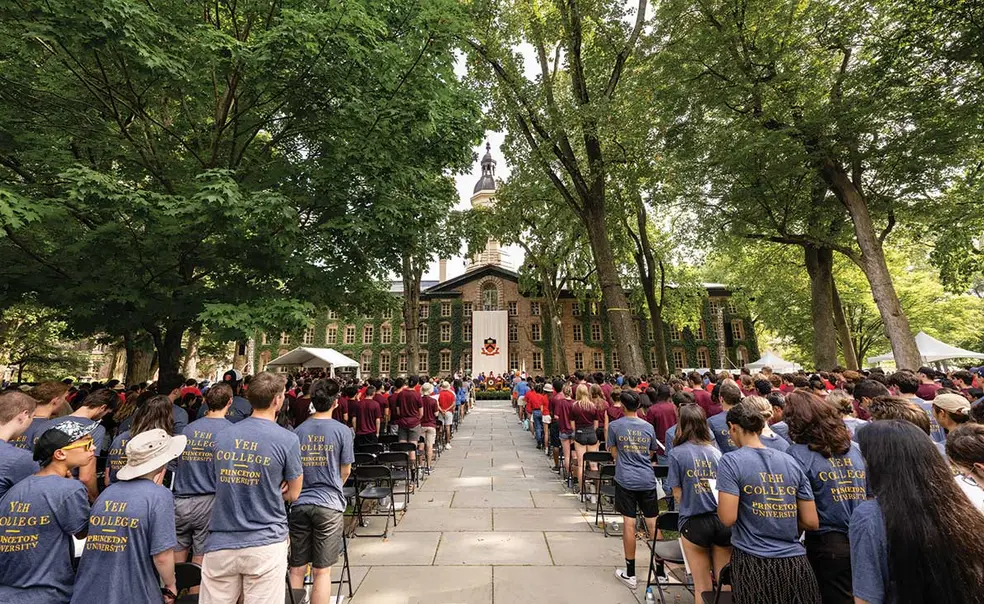Princeton Will Be Free for Families Earning Under $100,000
Next fall the threshold will increase from $65,000, among other financial aid changes
Princeton announced Sept. 8 that, starting next fall, undergraduates from most families that earn up to $100,000 annually will not have to pay for tuition or room and board at the University, and that families earning as much as $300,000 annually will also receive additional support.
Currently, families that earn less than $65,000 receive full financial support for tuition and room and board. Next fall, with that number raised to $100,000, about 1,500 students, a quarter of all undergraduates, will receive this level of aid, according to a University announcement.
The expanded financial aid program will also add support for families making more than $100,000 per year, and in particular, families earning $150,000 or less and those with multiple children in college. The average contribution of a Class of 2026 family making between $140,000 and $160,000 is currently $23,675; under the revised methodology, families with an income of $150,000 would pay $12,500 next fall. Even families making $300,000 annually would see a decrease in expected contributions — from $65,500 this year to $50,000 next year. This academic year, the total cost of attendance for undergraduates is $79,540.
“These improvements to our aid packages, made possible by the sustained generosity of our alumni and friends, will enhance the experiences of students during their time at Princeton and their choices and impact after they graduate,” said President Eisgruber ’83.
Every Ivy League school offers full tuition to students from low-income families, though the income threshold varies from $60,000 (Cornell) to $150,00 (Columbia), and not all schools cover additional expenses such as room and board.
Princeton also announced that it will eliminate the previously standard $3,500 annual student contribution so that students can more easily study abroad and pursue other activities. The annual personal and books allowance, which supports miscellaneous expenses, will also see a $550 increase next year, totaling $4,050.
The University announcement said that since 2001, when Princeton eliminated loans from its financial aid packages, “more than 10,000 undergraduates have benefited from Princeton’s aid program, which meets students’ full financial needs with grants that do not need to be repaid.”
Prior to the no-loan policy, about 6 percent of undergraduates qualified for federal Pell Grants; this year, the University said that 21 percent of the incoming class was Pell-eligible.
The number of students receiving aid has increased significantly since that landmark decision. PAW previously reported that prior to the no-loan policy, about 6 percent of undergraduates qualified for federal Pell Grants; this year, the University said that 21 percent of the incoming class was Pell-eligible.
Jennifer M. Morton ’02, a philosophy professor at the University of Pennsylvania and author of Moving Up Without Losing Your Way, last year’s Pre-read, was happy to see Princeton’s announcement, but she also said that “even when tuition, room, and board is covered, it’s not enough for some students to be able to make ends meet,” and that “low-income students still face significant financial barriers to attending college, from having money to participate in social activities to being food insecure or not having housing over the breaks.”
While Princeton makes resources available to students to address many of these concerns, including the University Safety-Net Fund and continuous housing and dining options, not all schools can say the same.
In Morton’s view, a government-level systemic solution is needed to address higher ed’s financial situation, rather than temporary solutions, such as President Joe Biden’s student loan debt forgiveness, and what Morton called “local fixes,” like Princeton’s improvements to financial aid.










1 Response
David Goetz *72
3 Years AgoFree Tuition Programs Require Sound Endowment Decisions
I was encouraged to see that Princeton can provide more free tuition, room, and board for even more students (On the Campus, October issue). But I was sad to see Princeton divesting itself of the means to pay for these positive programs. Fossil fuels are necessary for at least another two decades, and Princeton should continue to reap this industry’s profits until fossil fuels are replaced by secure nuclear and renewable power sources. That should be possible soon, but not now. Why should Princeton shoot itself in the foot without reason? The future of Princeton and future Princeton students deserve sound decision-making based on facts and not on emotion.